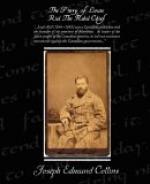But when Lord Selkirk planted here his sturdy Scotchmen, wild beasts and game were not the only inhabitants of the plains. The Crees, a well-built, active, war-loving race, had from ages long forgotten roamed over these interminable meadows, fishing in the streams, and hunting buffalo. Here and there was to be found one of their “towns,” a straggling congregation of tents made of the skins of the buffalo. Beautiful, dark-skinned girls, in bare brown, little feet, sat through the cool of evening in the summer days sewing beads upon the moccasins of their lovers, while the wrinkled dame limped about, forever quarrelling with the dogs, performing the household duties.
But the Crees liked not the encroachment upon their territories by these foreign men with pale faces; and they held loud pow-wows, and brandished spears, and swept their knives about their heads till their sheen gleamed many miles over the prairie. Then preparing their paint they set out to learn from the pale-faced chief what was his justification for the invasion.
“You cannot take lands without war and conquest,” were the words of a young chief with a nose like a hawk’s beak, and an eye like the eagle’s, to Lord Selkirk. “You did not fight us; therefore you did not conquer us. How comes it then that you have our lands?”
“Are you the owners of this territory?” calmly enquired the nobleman.
“We are; no one else is the owner.”
“But I shall shew you that from two standpoints, first from my own, and afterwards from yours, it belongs not to you. Firstly, it belongs to our common Sovereign, the King of England. You belong to him; so likewise do the buffalo that graze upon the plains, and the fishes that swim in the rivers. Therefore our great and good Sovereign sayeth unto me, his devoted subject, ’Go you forth into my territories in the North of America, and select there a colony whereon to plant any of my faithful children who choose to go thither.’ I have done so. Then, since you hold possession of these plains only by the bounty and sufferance of our good father the King, how can you object to your white brethren coming when they were permitted so to do?”
Ugh; that was only the oily-tongued talk of the pale-faces. While seeming to speak fair, and smooth, and wise, their tongues were as crooked as the horn of the mountain-goat. Yet no chief could answer the Earl’s contention, and they looked from one to another with some traces of confusion and defeat upon their faces.
“But,” continued Lord Selkirk, in the same grave and firm voice, “from your own standpoint you are not the proprietors of this territory. The Saulteux, with whom you wage your constant wars, have been upon these plains as long as you. In times of peace you have intermarried with them, and I now find in your wigwams many a squaw obtained from among the villages of your rivals.”
Ugh! They could not deny this. It was evident from their silence and the abject way in which they glanced from one to another that the case had gone against them.




